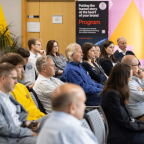
AI helping divorcing couples - and its risks
This week marks Good Divorce Week, which highlights ways in which separating and divorcing couples can reach agreements without unnecessary acrimony.
Couples looking to separate may be able to use artificial intelligence to help sort out their divorce – from dividing assets to parenting arrangements.
Technology has played a key role in resolving disputes in recent years – including analysing large amounts of data and managing risk.
But software developers and lawyers warn such tools could be limited in complex cases.
Philip Graves of GWS Robotics, a robotic application development agency in Bristol, said: “A well-programmed piece of software could help someone considering a divorce in a number of ways - from advising on necessary procedures to generally worded counselling.
“But divorce can be a complex, emotional process and software has its limitations - particularly when partners are not speaking or in instances of domestic abuse.”
Algorithms in mediation
A computer algorithm was used for the first time in 2019 to facilitate and settle an online dispute.
The SmartsettleONE, using a kind of ‘blind bid’ mechanism, resolved a case over unpaid fees for a counselling course, which had been in the court process for several months.
And the Australian government is currently backing the use of an online app called Amica to support separating couples.
Philip, who first learned to program computers in the mid-1980s, said: “It might save time and money in the initial stages. But software is only as good as its programming and its reading of the user data input into it.
“It may make assumptions or deductions based on its pre-programming, which could lead to crossed wires and further complications.
“We also communicate with more than just words, and our other signals can be picked up intuitively by professionals whose skill is honed by experience.”
Domestic abuse and coercion
Citizens Advice showed searches for advice about getting a divorce increased when lockdown started.
Lauren Preedy, head of the divorce team with Ian Walker Family Law and Mediation Solicitors, which has offices across the South West, including Exeter, Bristol and Bath believes people may be reassessing their lives since the pandemic outbreak.
Lauren, who has been acting in private family work for more than 15 years, said: “More people seem to be assessing their lives and what is important to them. I think it’s prompted people to take action sooner than they may have done before the pandemic.”
Lauren, who is chair of Somerset Resolution, a regional committee to share advice on good practice with other solicitors, said domestic abuse and coercion can be subtle and a web tool or robot would not spot the signs.
She said: “We deal with very sensitive and upsetting cases. Domestic abuse comes in many forms and coercive control or financial control in particular can be hard to detect.
“Sometimes clients are in distress because they do not realise the situation they are in. It takes careful questioning and the ability to build up a relationship for these issues to be explored and the correct help given.”
Wider implications
Lawyers look at the wider implications and also assess if a case is suitable for mediation.
Lauren, who has knowledge in other areas of law, said: “Often it is not just a case of advising on the divorce itself, but related financial, business and childcare matters. A web tool would not be able to pin-point the other issues and wider implications.
“We are helping people in the most difficult times of their lives. This requires kindness, empathy and support, which a robot or web tool would not be able to provide.”









